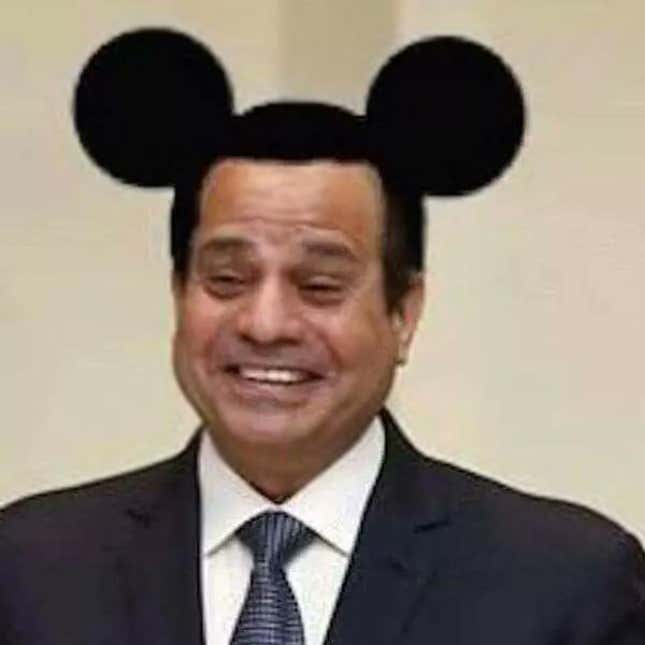It hasn’t been a great year for internet freedom.
In 2015, citizens everywhere from Paris to Myanmar were accused and sentenced for sharing jokes and opinions on social media. Now, a Thai factory worker faces up to 32 years in prison for having “liked” and shared a doctored photo of the nation’s king, and for sharing an infographic that denounced corruption in the construction of a tourist attraction.
Worldwide, internet freedom has declined for the fifth consecutive year, according to US watchdog organization Freedom House, which counts factors like content removal, censorship, surveillance and intimidation practices. According to the same report (pdf), nearly seven of every ten of global internet users are either not free or only partly free today, with internet use particularly limited in China, Iran, Syria, Ethiopia, and Cuba.
The images below provoked some of the year’s most severe penalties for social media use:
Buddha with headphones, Myanmar

In March, three people were sentenced to two and a half years in prison for posting a psychedelic image of Buddha wearing headphones to Facebook. The picture was created by bar manager Phillip Blackwood, 32, and colleagues, Tun Thurein, 40, and Htut Ko Ko Lwin, 26, to promote a party in Yangon, Myanmar.
Despite their public apologies, the three were arrested in Dec. 2014 and judged in March 2015, part of a larger movement of Buddhist nationalists to reinforce religious strictness in the country. Insulting religion is a crime within the country’s penal code, according to the New Zealand Herald.
Sisi as Mickey Mouse, Egypt

Amr Nohan, 22, got three years in prison for doctoring an image of Egyptian president Abdel Fatah al-Sisi with Mickey Mouse ears.
Nohan was serving in the Egyptian army when he shared the image on Facebook, so his case was judged by a military court, which also took into consideration other “improper” Facebook posts he had made. In August, Nohan was indicted for “attempting to overthrow the regime,” a relatively common charge, and for having “thoughts inside of him that run contrary to that of the ruling regime,” according to the indictment, accessed by BuzzFeed.
Egypt ranks a dismal 136th out of 152 countries in the Human Freedom Index, which measures freedom of speech, association, religion, sexuality and movement, among other indicators. Nevertheless, the decision sparked outrage online: a hashtag was created in solidarity with Nohan, even more people shared the image in support, and online news sites spread news of the ruling, sometimes also in meme-form.
Erdoğan as Gollum, Turkey

In October, Turkish doctor Bilgin Çiftçi was fired from his job in public health service and put on trial for sharing the image above on Facebook, which compares Gollum, a character from the blockbuster film series Lord of the Rings, to Turkish president Recep Tayyip Erdoğan.
Çiftçi was charged with “insulting a public official,” which could come with a two-year prison sentence. However, his judges appear to be struggling with judging a case based on a complex fictional universe: Turkish media report that the trial was halted because the chief magistrate had not seen the 9-hour long Hollywood trilogy, and a team of experts (composed of two academics, two psychologists, and an expert on cinema) convened to decide whether the image constitutes an insult. The court will reconvene in February of 2016.
Green longyi and green uniform, Myanmar

This month, 25-year-old Chaw Sandi Tun was sentenced to six months in prison for sharing this composite photo, which compares the green longyi worn by Myanmar politician Aung San Suu Kyi to the green uniform of general Min Aung Hlaing. Arrested in October and condemned in December, Tun’s sentence was based on a new law that forbids using communications networks to “extort, threaten, obstruct, defame, disturb, inappropriately influence or intimidate.”
Senior general Min Aung Hlaing commands Myanmar’s armed forces in a country controlled by a military junta since 1962. Aung San Suu Kyi leads the country’s main opposition party, the National League for Democracy, which won the majority of parliamentary seats during Myanmar’s landmark elections in November.
“Myanmar has the third worst freedom score in the world, according to the Human Freedom Index, after Iran and the Democratic Republic of Congo.
Comparisons to ISIL, Saudi Arabia
After condemning Palestinian artist Ashraf Fayadh, 35, to death in November, Saudi Arabia announced plans to sue an unnamed Twitter user for calling the decision “ISIS-like.” According to Reuters, which cited a justice ministry source interviewed by a government-aligned newspaper, “questioning the fairness of the courts is to question the justice of the Kingdom and its judicial system based on Islamic law.”
In 2015, 153 people were put to death by the Saudi government, according to Agence France-Presse; nearly double the 87 killed in 2014. Saudi Arabia ranks 141st, between Republic of Congo and Chad, in the Human Freedom Index. This most recent attempt to curb freedom of expression was criticized internationally on Twitter. Kenneth Roth, executive director of Human Rights Watch, answered Saudi Arabia’s decision to sue by sharing the image above, with the message: “See you in court.”
